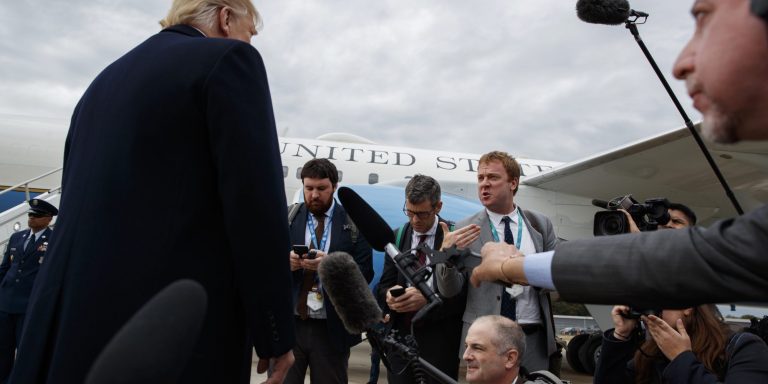INTELBRIEF
October 15, 2018
IntelBrief: Will There Be Meaningful U.S. Reaction to Khashoggi?

- In an interview with CBS 60 Minutes, President Trump said there would be ‘severe punishment’ if proven that Saudi Arabia murdered Jamal Khashoggi.
- The President again hesitated to link arms sales to any ‘punishment,’ saying ‘I don’t want to hurt jobs,’ even though those sales are still more theoretical than actual.
- There appears some actual pressure from Congress to respond with tangible measure rather than stated handwringing and faux outrage.
- The U.S.-Saudi relationship since the ascendance of Crown Prince Mohammed bin Salman demonstrates the problem with basing relationships on personalities over principles.
.
Obvious reticence by the Trump administration to do more than express manufactured outrage over Saudi Arabia’s possible murder of Jamal Khashoggi might be giving way to a more fulsome reaction by the government. On the other hand, it might not be, and the issue, like many before it, will burn brightly but briefly before fading from the headlines. Many fear that the U.S. will immediately return its focus to weapons sales to the Saudis and focusing almost exclusively on Riyadh’s role in countering Iran, instead of its poor human rights record and destabilizing actions in the region. The United States consistently sides with the Saudis, despite recent diplomatic spats between the Kingdom and American allies like Germany and Canada, and also despite the ongoing catastrophe that is the Saudi war in Yemen.
President Trump’s reaction to Khashoggi has evolved just over the course of the past week alone, suggesting that his administration is at least aware of the optics (his first reaction was to diminish the murder by saying that ‘this took place in Turkey, and to the best of our knowledge Khashoggi is not a U.S. citizen’). ‘As to whether we should stop $110 billion from being spent in this country — that would not be acceptable to me.’ While the U.S. has long been hypocritical in terms of ignoring human rights abuses while supporting oppressive governments for the sake of a ‘stability’ and arms sales, rarely has a U.S. President so blatantly insinuated that the murder of a high-profile dissident would be ignored for the sake of continued security cooperation with a mercurial ally.
The U.S. might be reconsidering its initial official reactions. That reconsideration is being driven by Turkey. Ankara has steadily publicized the horrific details of what it claims to be Saudi involvement, as well as a growing move by prominent companies, consulting firms, and media to, at least temporarily, step away from Saudi-funded endeavors such as the upcoming ‘Davos in the Desert.’ During an interview with CBS 60 Minutes recorded on October 12, President Trump stated that there would be ‘severe punishment’ if it is proven that Saudi Arabia indeed murdered Khashoggi, a U.S. permanent resident and columnist for the Washington Post. He again hesitated to link arms sales or economic sanctions to a potential U.S. reaction, saying he didn’t want to ‘hurt jobs’ and ‘lose an order like that,’ adding that ’there are other ways of punishing, to use a word that’s a pretty harsh word, but it’s true.’
With no current U.S. ambassador to Saudi Arabia, the President’s son-in-law, Jared Kushner, has been tasked with managing a relationship that is among the most problematic and important for Washington. President Trump stated to 60 Minutes that Kushner had called Saudi Crown Prince Mohammad bin Salman and that bin Salman had denied any involvement with a case in which the Turkish government—and Khashoggi’s fiancé—can prove that Khasoggi walked into the Saudi consulate in Istanbul on October 2, while the Saudis can’t prove that he walked back out. In describing Kushner’s call with the Crown Prince, President Trump said the Saudis deny it all, that ’as of this moment, they deny it, and they deny it vehemently. Could it be them? Yes.’
On October 10, 22 U.S. senators, including the chairman of the Foreign Relations Committee, sent a letter asking that the administration ‘determine whether a foreign person is responsible for an extrajudicial killing, torture, or other gross violation of internationally recognized human rights.’ Such a determination could result in sanctions against prominent and well-connected Saudi individuals. The State Department responded with comment that the U.S. did not ‘know the facts of this case just yet.’ Support for Saudi arms sales transverses partisan lines—one of the few issues to do so—and it remains to be seen if there is any meaningful support for Congress to move toward tangible consequences in U.S.-Saudi relations. But the U.S.-Saudi relationship did not reach its current state overnight. Rather, bin Salman has been emboldened after being feted by an array of U.S. policymakers, pundits and intelligentsia during his whirlwind tour of the U.S. this past spring. Perhaps even more ominous is the lack of American leadership and unconditional support for the Crown Prince’s agenda, which has clearly led him to overreach and underdeliver. This is the problem with basing relationships on personalities over principles and the damage is multi-faceted, contributing to the erosion of legitimacy for U.S. national security objectives while simultaneously undermining stability in the Kingdom.
.
For tailored research and analysis, please contact: info@thesoufancenter.org
[video width="960" height="540" mp4="https://thesoufancenter.org/wp-content/uploads/2018/10/IB-1015.mp4" poster="https://thesoufancenter.org/wp-content/uploads/2018/10/AP_18285769273584-1-e1539533693991.jpg"][/video]